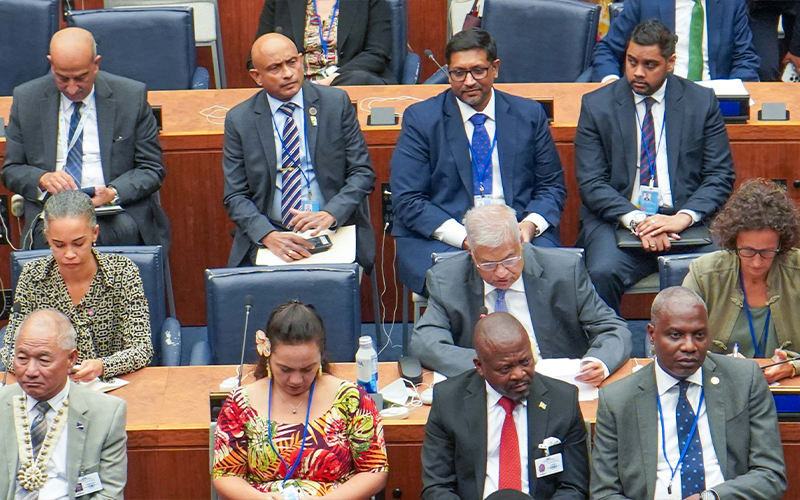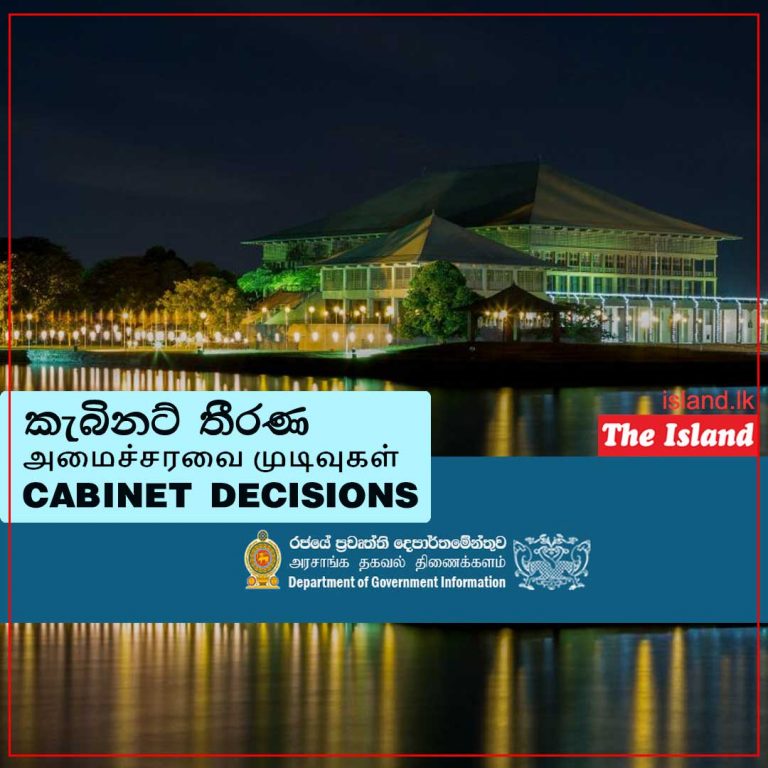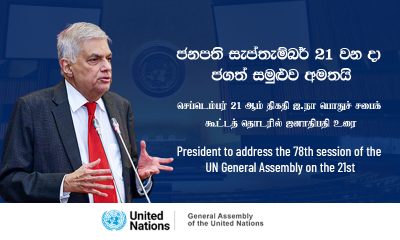Latest News
Sri Lanka unveils Climate Prosperity Plan and Climate Justice Forum to tackle climate challenges globally

President Ranil Wickremesinghe, speaking at the Climate Ambition Summit on the sidelines of the UN General Assembly on Wednesday (20), affirmed Sri Lanka’s commitment to the Secretary General’s accelerated climate agenda. He highlighted the importance of tangible climate actions and commended the delegates for their valuable suggestions.
President Wickremesinghe drew attention to the significant economic consequences of climate-related issues, with experts predicting a 1.5% GDP loss for Sri Lanka by 2050. In response, Sri Lanka has adopted a dual approach to climate ambition. At COP 27, the President launched the Climate Prosperity Plan, a strategy for green growth centered on renewable energy generation, leveraging the nation’s natural advantages in wind and solar power. This initiative aligns with Sri Lanka’s economic restructuring following the 2022 financial crisis, as the country aims to transition towards a green economy.
The second facet of Sri Lanka’s climate ambition involves supporting the establishment of a climate justice forum. This forum aims to foster international collaboration to address various climate challenges, including loss and damage adaptation and mitigation.
In addition to these efforts, Sri Lanka is proposing two critical measures on the global stage. First, the President suggested the creation of an international climate change university, designed as a global platform for research and development focused on climate mitigation actions.
Second, recognizing the need for responsible resource management, Sri Lanka is concentrating on areas where maximum impact can be achieved. The President introduced the Tropical Belt Climate Ambition Project, targeting the highly bio diverse tropical belt region.
Vulnerable communities in this area are disproportionately affected by climate change. “The tropical belt is the most tropically diverse region on earth. Typically, biodiversity increases as the latitude decreases. The biodiversity increases as we get closer to the equator. Vulnerable communities in the tropical belt are the worst impacted by climate change,” he added.
Investments in renewable energy, nature-based solutions and pollution control within the tropical belt have the potential to yield transformative results, benefiting not only the region but also temperate areas worldwide. Furthermore, the project aligns with the goals of climate change mitigation and adaptation, offering an opportunity for debt relief to low-income countries within the belt. “Not only in the tropical belt, but will also impact on the temperate areas outside. The nature based solutions could contribute substantially to climate change mitigation and adaptation. There are also a number of low-income countries within the belt who will be able to benefit from the debt relief that is being proposed.”
These initiatives, the Tropical Belt Climate Ambition Plan and the proposed debt relief for low-income economies within the belt, are poised to make a substantial contribution to advancing the Secretary General’s accelerated climate agenda. President Ranil Wickremesinghe’s statement underscores Sri Lanka’s dedication to addressing the pressing challenges of climate change on both the national and global fronts.
(PMD)
Latest News
Former state minister arrested by CID

It has been reported that former State Minister Sivanesathurai Chandrakanthan alias ‘Pilleyan’ has been arrested by the Criminal Investigation Department (CID).
Latest News
Maintaining public trust is a fundamental responsibility of the Police Department – President

Attending the passing out parade of the 82nd batch of the Special Task Force (STF) at the Katukurunda STF Training Camp in Kalutara on Monday (07), President Anura Kumara Disanayake emphasized the need for a progressive transformation within the Sri Lanka Police to ensure the rule of law, order and authority.
The President noted that the public places its trust in the Sri Lanka Police to uphold the supremacy of the law and maintaining that trust is a fundamental responsibility of the Police Department.
Addressing the newly commissioned officers, President Disanayake stated that how one serves and respects their profession is reflected in their career and urged the officers to embrace their professional duty in a way that contributes meaningfully to the transformative change the country requires.
Highlighting the current state of institutional breakdown in many sectors, the President pointed out that the people have already initiated change by altering the political authority, but reiterated that political transformation alone is insufficient. Instead, a comprehensive and positive transformation across all sectors is necessary for national progress.
The President further emphasized that new police officers carry the responsibility of meeting public expectations. He called on them to ensure public safety and security and to prevent the nation from falling prey to organized crime and drug-related issues.
He also stated that the younger generation must take responsibility for the motherland, bearing that duty on their shoulders and should strive to steer both their personal future and the future of the country in a positive direction.
President Disanayake concluded by saying that joining the regular service of the Sri Lanka Police today should be remembered by all as a significant and powerful step forward.
The President further noted that the service rendered by the Special Task Force (STF) on behalf of the public during times of emergency and disaster is highly commendable.
A total of 118 newly recruited Sub-Inspectors and 231 Probationary Police Constables who successfully completed their basic training graduated during the ceremony.
President Anura Kumara Disanayake awarded certificates and honours to officers who demonstrated exceptional performance during the training programme.
A commemorative token was also presented to President Disanayake, who attended the ceremony as the Chief Guest.
An operational demonstration by STF officers on a simulated battlefield was presented as part of the event.
Established in 1983 under the theme “Victory is Certain”, the Sri Lanka Police Special Task Force is currently recognized as a prestigious unit deployed for VIP protection, crime and organized crime suppression and narcotics control efforts aimed at building a drug-free nation.
The ceremony was attended by Minister of Public Security and Parliamentary Affairs Ananda Wijepala, Minister of Health and Mass Media Dr. Nalinda Jayatissa, Deputy Minister of Public Security Sunil Watagala, Secretary to the Ministry of Public Security Ravi Seneviratne, Acting Inspector General of Police Priyantha Weerasooriya, STF Commanding Officer Senior Deputy Inspector General of Police Samantha de Silva, along with other senior police officers, the parents of graduating officers and other invitees.
[PMD]
Latest News
National minimum monthly salary for private sector employees raised to Rs. 27,000/-, minimum daily wage to Rs. 1080/-

Parallel to salary hike of public sector officers by the budget proposals 2025, it has been proposed to increase the salaries of private sector employees as well.
Accordingly, the Cabinet of Ministers granted approval to the proposal submitted by the Minister of Labour to revise the national minimum monthly salary and national minimum daily wage and follow other legal actions as follows:
• To raise the minimum national monthly salary by rupees 9,500/- from rupees 17,500/- to rupees 27,000/- with effect from 01.04.2025
• To raise the minimum national daily salary by rupees 380/- from rupees 700/- to rupees 1,080/- with effect from 01.04.2025
• To raise the minimum national monthly salary by rupees 3,000/- from rupees 27,000/- to rupees 30,000/- with effect from 01.01.2026
• To raise the minimum national daily salary by rupees 120/- from rupees 1,080 /- to rupees 1,200/- with effect from 01.01.2026
-

 Business2 days ago
Business2 days agoColombo Coffee wins coveted management awards
-

 Features3 days ago
Features3 days agoStarlink in the Global South
-

 Business4 days ago
Business4 days agoDaraz Sri Lanka ushers in the New Year with 4.4 Avurudu Wasi Pro Max – Sri Lanka’s biggest online Avurudu sale
-

 Business5 days ago
Business5 days agoStrengthening SDG integration into provincial planning and development process
-

 Business4 days ago
Business4 days agoNew SL Sovereign Bonds win foreign investor confidence
-

 Sports6 days ago
Sports6 days agoTo play or not to play is Richmond’s decision
-

 Features3 days ago
Features3 days agoModi’s Sri Lanka Sojourn
-

 Sports5 days ago
Sports5 days agoNew Zealand under 85kg rugby team set for historic tour of Sri Lanka












